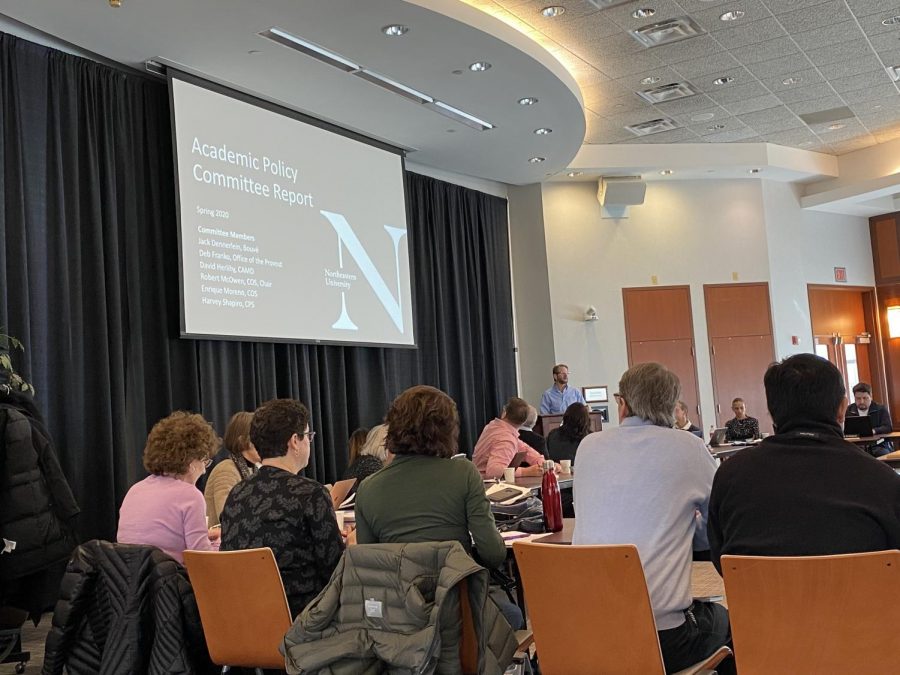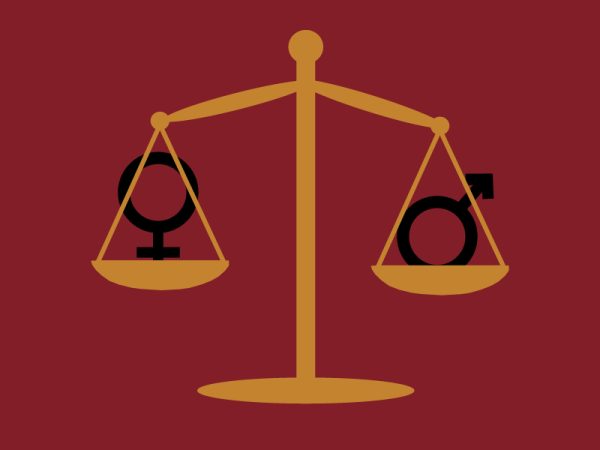Spring semester teaching policy raises diversity, childcare concerns for faculty, graduate students
Faculty senate, pictured meeting last semester, raised concerns that this new policy change would disproportionately impact women and people of color, directly contradicting the university’s diversity and inclusion initiatives.
October 30, 2020
As a working parent, communication studies professor Brooke Foucault Welles has spent the fall semester learning to balance teaching her courses remotely and taking care of her young children that are learning from home. Because of previous exceptions allowed by the university, Foucault Welles was permitted to teach remotely for the fall semester.
That may change for many faculty and staff, like Foucault Welles after they had received an email from the university Oct. 22. The email detailed a new remote teaching policy for the spring semester, expecting faculty to return to campus for in-person teaching and research.
Included in the email were two options by which faculty members could request remote work: if a faculty member was at higher risk under the CDC guidelines, or if faculty lived with someone with a medical condition or at increased risk to COVID-19. Age would no longer be a sole determining factor. Another glaring circumstance missing from the email was exceptions involving childcare. Without access to any outside childcare services, Foucault Welles is in a tough position.
“I can’t see a way for me to be on campus and this situation to be attainable,” Foucault Welles said.
However, the university told The Boston Globe that while childcare was not explicitly mentioned in the email, the university understands these concerns and will be flexible in considering requests for remote work.
“We are aware that people have other important family obligations and wanted the wording to be broad and inclusive,” university spokesperson Renata Nyul said.
Faculty members also raised concerns that this policy change would disproportionately impact women and people of color, directly contradicting the university’s diversity and inclusion initiatives.
“This new policy runs directly counter to the university’s claims that it wants to be better with diversity and inclusion,” said English professor Ryan Cordell. “We know that this pandemic is disproportionately influencing women, we know that it’s disproportionately influencing people of color, and for the university in the same week to say we want to be a more diverse campus and then to also make this announcement is something that faculty will be working to highlight in the ways that we approach the administration.”
Foucault Welles echoed these thoughts as well.
“My unfavorable impression is that it’s a deliberate attempt to get women to leave the workforce,” she said. “I hope that that’s not true, but it sure does feel like it.”
These actions against diversity, equity and inclusion have motivated faculty to quit their positions overseeing these topics within the faculty senate, said a senior member of Northeastern’s faculty who wished to remain anonymous.
“One of the biggest concerns and inconsistencies is specifically related to diversity, equity and inclusion,” they said, “and I know some faculty are saying they’re resigning from contributing to those committees that advance diversity on campus, because they cannot in good faith continue to do that service while the university is actively and unnecessarily implementing policies that harm communities that they’re supposed to be helping.”
Faculty are expected to submit their requests for remote work by Nov. 6. In a follow-up email to faculty Oct. 27, Provost and Senior Vice President for Academic Affairs David Madigan explained that the university would be flexible when considering faculty’s ability to do work other than teaching, such as research and committee meetings, in person.
“I should add that flexible approaches to all other work are, of course, reasonable. If you expect that it would be a genuine and significant hardship for you to teach in person in the spring, please contact your department chair (or associate dean for faculty in non-departmentalized colleges) via email with a brief explanation of your hardship, which will be forwarded to my office to be reviewed,” Madigan wrote.
Madigan also sent an email Oct. 30 to faculty, which reflected more specific circumstances regarding hardship and that the university will not expect faculty facing those circumstances to return.
“Understandably, many of you have described real hardship with respect to health conditions, specific childcare needs and similar family situations, among others,” Madigan wrote in the email. “To be clear, no faculty member facing such hardships will be compelled to return in the Spring.”
The email emphasized the university’s understanding of and accommodation for the ever-changing nature of the pandemic.
“As we approach the November 6th deadline, the Faculty Senate has suggested that we consider that faculty circumstances may change over time, and that they be allowed to request remote teaching later if they encounter a new hardship. Given the fluid nature of the pandemic, I concur.”
Neither email addressed how this new change in policy would impact graduate students that teach courses. Graduate students, despite being expected to teach courses in person as well, have not received any communication about the new policy and how it pertains to their instruction.
“PhD students are in an interesting place in the sense that they’re students … but they’re also instructors,” Cordell said. “They teach writing courses and literature courses and many of them have a lot of concerns. They actually didn’t even get an email last week, even though many of them are classroom teachers and theoretically would also have to request the same kinds of exceptions if they could not be in the classroom.”
Northeastern’s Senior Vice President of External Affairs Mike Armini noted that the new policy would not impact graduate students.
“The policy changes we’re working through pertain to faculty. Grad students are students, first and foremost,” he wrote in an email to The News.
Greg Palermo, a graduate student in the English department, mentioned that graduate students are working to support other faculty while also being actively involved in talks to determine their next steps in approaching the university.
“I think this is an opportunity for solidarity among instructors and educators of different job roles across the university when the university pulls something like this that affects so many of us,” he said. “If they don’t make some serious changes on this there will be organized pushback.”
As some faculty members have expressed, Palermo believes that graduate students are not being heard by the university.
“I am overwhelmingly exhausted and most of that is because I do not feel the support of the institution behind me and the work I am contributing to it because they signaled that they don’t care about our health and safety, and that they value potential losses of revenue or what they believe will be potential losses of revenue over that,” he said.
In response to the NUflex model, professors were forced to change how they’ve previously taught their classes in the past. Some faculty argue that a shift to in-person learning with pandemic guidelines still in place does not make sense for every class.
“There’s been a lot of advocacy and trying to work with the administration and trying to get them to understand … some classes, especially discussion-based classes, [that] being in the classroom is not necessarily better,” the anonymous faculty member said. “So that the university’s stance that they want all faculty in the classroom, it seems motivated by some other factors other than what’s pedagogically the best for each class.”
Madigan wrote in his follow-up email to faculty that because a large population of the student body is on campus, faculty is expected to come in person and deliver a traditional learning experience for them.
“More than 90 percent of our undergraduates have returned to campus and it is our obligation to provide them with the benefits and magic of a Northeastern education,” Madigan wrote.
Palermo noted that this justification provided by Madigan counters his experience teaching in the classroom.
“In my discussion-based class, one student has been on campus once, and that was the first week of class. Everyone since then has been entirely remote,” he said. “I’m curious to see what metrics they are using that are saying that students want to be in the classroom. On my NUflex interface week after week students express a preference to be in the classroom, but then they ultimately do not do that.”
As COVID-19 cases are beginning to spike in Massachusetts, faculty members are worried that returning to campus is not the safest for their health.
“I wish that we could have a full in-person, on campus experience too, but that’s not reality right now, especially as cases are spiking again,” Foucault Welles said. “We can’t safely do that, so I don’t think the students are really asking for it.
Foucault Welles stressed that she felt faculty have done an excellent job in completely changing the format of their courses to fit the NUflex model.
“I think that there’s probably concern that some faculty or staff are not working to their full capacity remotely. I wish that the university would have a more trusting and inclusive attitude about the folks who have pulled off this sort of incredible change. We’ve totally overhauled how higher-ed works, and yet to me it seems to be working.”
Foucault Welles is worried that the educational experience will be worse for students in the spring, as faculty will not have enough time to adjust their classes to fit the model that this new policy requires.
“Over the summer, we developed these classes that work very well in a hybrid model. Most faculty aren’t paid over the summer, but we worked anyway and went to these sessions to learn how to do hybrid and Zoom-based engagement and all that,” Foucault Welles said. “We can’t teach in the way from before, we also can’t teach in the way that we spent three months in intense training, prepping for, and so now we’re looking at, in the middle of the semester, when are we going to be planning these classes? It’s not clear to me how that’s going to be pulled off effectively.”
Northeastern’s faculty senate and other faculty crafted an open letter to the university, garnering more than 440 signatures within 24 hours after it was posted online.
“The disregard for the impact of the new policy on our academic community, and the failure to abide by the university’s established system of shared governance, have created an erosion of confidence in university leadership,” the letter said. “The lack of transparency and the failure to communicate a clear justification for changing the current policy have created a loss of trust. And the failure to acknowledge all the creative, committed, and effective work of faculty and staff so far during the pandemic has created a crisis of morale.”
Additionally, one junior professor published an anonymous op-ed with The News calling for students to help their professors fight the new policy.
“We need the kind of flexibility we had in the fall to deliver our best teaching and avoid untenable situations for women and faculty of color, who are already underrepresented at Northeastern,” the professor wrote. “So, I am asking you to speak out and push back. … We love being your teachers, and we are fiercely committed to delivering top quality education to you in this unprecedented time. Please help us get the support and flexibility we need to do our jobs.”
As faculty approach the university with their concerns about the new policy, they stress that in such an unpredictable time they are hoping the university will work to be more accommodating.
“The NUflex model was supposed to be flexible, offering flexibility for both students and faculty to be able to do what works best under each individual’s situation,” the anonymous faculty member said. “It’s been very disappointing though to actually see that despite all of the concerns that were raised and all of the really hard and innovative work that faculty have been doing this semester … for the university to then change the plan for next semester without real appreciation and consideration for all these issues is disappointing, but in a way not totally surprising.”


















